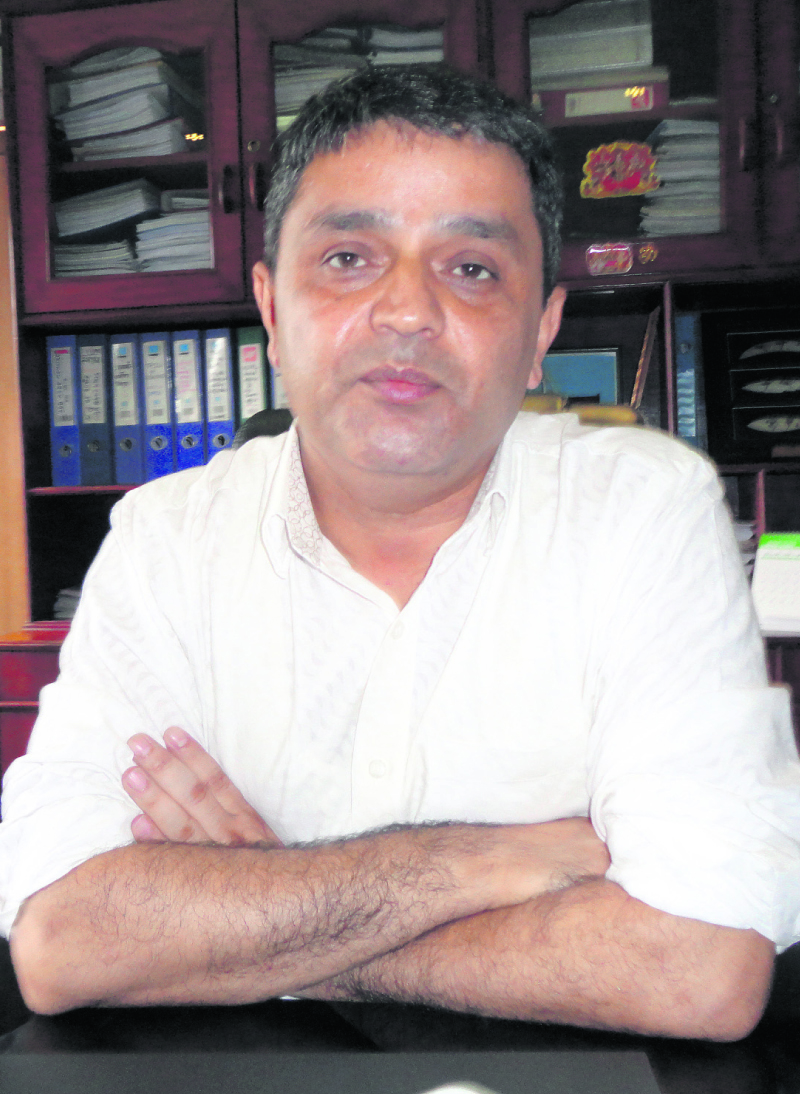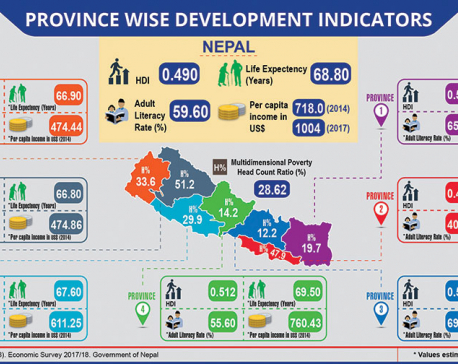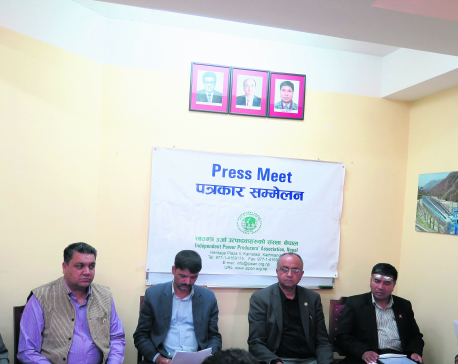
OR
Govt intervention will hamper KUKL reform efforts
Published On: July 26, 2017 01:45 AM NPT By: Rudra Pangeni | @rudrapang

The nomination of the Secretary of the Ministry of Water Supply and Sanitation, Bhim Prasad Upadhyaya, as board director of the Kathmandu Upatyaka Khanepani Limited (KUKL), has brewed fresh controversy in the water utility. The first board meeting of KUKL since Upadhyaya's nomination was scheduled for Friday. But the meeting couldn't convene after at least three board members denied accepting Upadhyaya's nomination and also rejected Upadhyaya's claim for chair of the board. Sources say Upadhyaya lobbied with the Prime Minister for intervention, blaming the KUKL management of being inefficient. This is not the first time that KUKL has fallen into controversy. KUKL faced long-running stalemate until the former chair Suresh Basnet resigned from the post. Rudra Pangeni of Republica talked to KUKL General Manager Mahesh Bhattarai to know more about the affairs at the KUKL. Excerpts:
Secretary Upadhyaya took to social media to blame you and your management for becoming inefficient in managing water supply in Kathmandu Valley and disobeying the government? What do you say?
The accusations made in social media are not correct. Everybody knows we cannot supply sufficient water as our sources can supply only around 150 million liters per day against the peak demand of 450 million liters per day. The supply dips further to 100 million liter in dry months. We have been portrayed as the only culprit, which is not true. We all are awaiting Melamchi water for adequate supply. Furthermore, our supply system is ageing which affects our efforts for equitable supply.
Why was he against your training trip to Australia?
I have no idea. Neither I, nor my team has breached any direction from the government. The visit of three KUKL officials, me and one from Project Implementation Directorate, for training was approved by the former minister. The KUKL board had also endorsed the decision before we flew to Australia to participate in the training hydraulic modeling, using GIS (Geographic Information System) in water distribution, among others.
Could you please tell us what happened in the board meeting held on Friday?
Let me first tell you about legal aspect of the company. The Ministry of Water Supply and Sanitation is also a shareholder of the company and its two representatives are in the KUKL board. According to a KUKL rule, which has been endorsed by the board, a joint secretary and an undersecretary will have to represent the ministry in the board. Now, the secretary may have realized the need to sit in the board himself along with the joint secretary for the betterment of KUKL which is good. I also attended the meeting as an invited member. But the board meeting couldn't proceed.
Representatives of Kathmandu Metropolitan City (KMC) and Lalitpur Metropolitan City (LMC) did not attend the meeting as their respective municipal councils were underway. Board member present in the meeting objected to breach of company rules due to secretary's representation in the board. Also, three board members -- KMC representative Mahesh Kafle, ADB representative Kamal Pandey and Nepal Chamber Commerce President Rajesh Kaji Shrestha denied signing attendance register. The meeting could not proceed in the lack of quorum.
Also, the secretary also claimed for the post of chairperson, arguing that the government owns major assets of KUKL. Meanwhile, KMC has also tabled claim for the chair, registering a separate letter at the KUKL. The post has remained vacant after Chairman Ghanashyam Bhattarai, a representative from the ministry, took retirement. KUKL meetings are presided over by nominating chairperson on consensus since March.
Some key issues, including discussions on KUKL's new organizational structure to appoint over five dozen technical hands like engineers, overseers, and election of new chairman, were in the agenda. Delay in approval of the organizational structure may affect new recruitments which is key to managing supply of Melamchi water.
Was there any discussion on government's intervention in KUKL?
I am surprised by this intervention. The accusation and intervention has come at a time when KUKL is heading in the right direction by initiating slew of reforms. The government's intervention will hamper reforms efforts that we have started at KUKL. The ministry remained silent when there was problems in initial months after I took the reins in January last year. But now the ministry is intervening in our affairs while all performance indicators are positive. We managed to hold four annual general meetings (AGMs) in just 17 months.
The accusation regarding delay in auditing is baseless. Our two annual general meetings have approved four audit reports from 2011/12 to 2014/15. We have already received draft audit report of 2015/16 which will be approved by the next AGM. Similarly, we also have plan to prepare audit report of 2016/17 by January.
KUKL started collecting data of outstanding due after I joined the office. We managed to recover Rs 100 million in the last fiscal year. Similarly, we have started computer billing system at all 10 revenue collection centers seven years after the contract to install the same was signed. We appointed over 200 staffers which had been delayed due to controversy. Similarly, plans are afoot to put in place a system to application for new water line online. Very soon our customers would be able to pay their bills through cards.
Why are there recurring controversies and disputes in KUKL?
We all have to follow basic concept of the company and revisit the mandate and the purpose it has been established for. Why it is not a corporation like other government entities? KUKL has been accused of not performing satisfactorily in the front line. We should realize that other stakeholders are also responsible to ensure smooth supply of drinking water. Our pipes are severed frequently in course of road widening or other development works. In its history, KUKL had not faced problem as severe as Friday's problem. KUKL work was going on smoothly even when we faced court case during our former president's tenure.
What next for KUKL?
I don't know what happens next. But I am hopeful of seeing a stronger KUKL as local units now have elected representatives and their active participation in the board will help in our efforts to bring about further reforms and pave the way for smooth supply and distribution of Melamchi water in the Kathmandu Valley.
You May Like This

Govt bringing major reform programs to breathe new life into economy
KATHMANDU, May 29: Finance Minister Yubaraj Khatiwada is expected to try breathing new life into the economy, with his budget for... Read More...

Govt brings back environment fee lifted by K P Oli govt
KATHMANDU, April 4: A one percent fee that was being charged separately for environment services for hydropower project companies lifted by... Read More...

New govt should follow course set by incumbent govt: PM Oli
KATHMANDU, July 30: Prime Minister KP Sharma Oli has said the next government was expected to follow the course set... Read More...




Just In
- Health ministry to conduct ‘search and vaccinate’ campaign on May 13
- Indian customs releases trucks carrying Nepali tea, halted across Kakarbhitta
- Silent period for by-election to begin from midnight
- SC issues short-term interim order to govt and TU not to take immediate action against TU legal advisor Khanal
- National consultation workshop advocates to scale up nutrition smart community in Nepal
- Patan High Court issues short-term interim order to halt selection process of NTB’s CEO
- NEPSE inches up 0.15 points; daily turnover increases to Rs 2.53 billion
- Bagmati Govt mandates tri-lingual signboards in offices














Leave A Comment